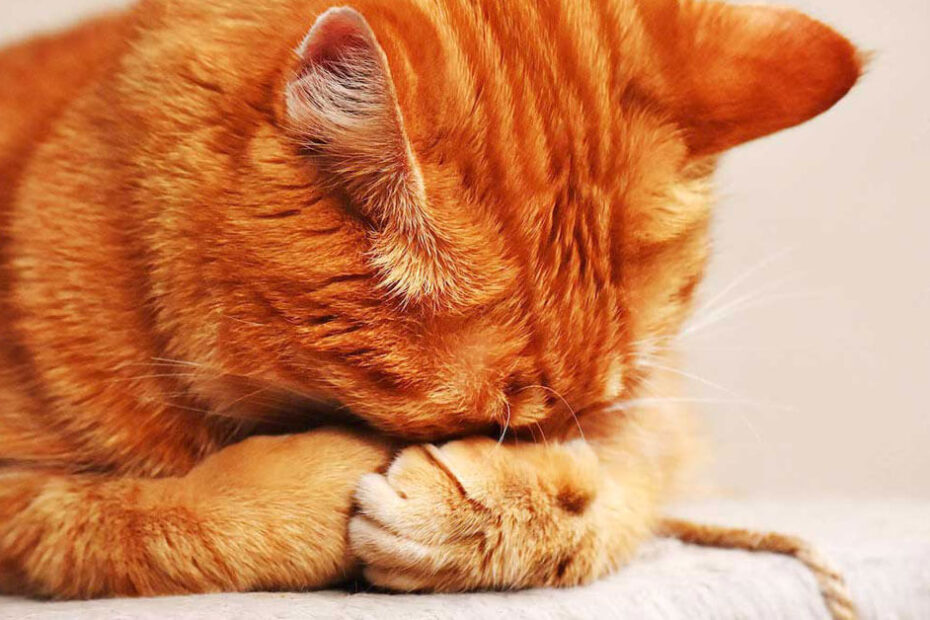Can cats catch a cold from humans? No! You aren’t going to make your cat sick just because you have a cold. Cats can’t catch a cold from humans because they are different species.

You do your best to be a good parent for your beautiful cat. You provide good, healthy food, make sure there is always fresh water available, give plenty of gentle, loving pets, offer an endless supply of tasty treats, and are always ready to play so that your cat gets plenty of stimulating exercise.
But then you get the sniffles and maybe a cough or a fever and you might become concerned about passing your cold on to your cat. You wonder, can that happen?
Can Cats Catch A Cold From Humans & Is it Possible?
As mentioned before cats don’t catch colds from humans because you and your cat are different species. The common cold is caused by a rhinovirus (rai·now·vai·ruhs) which can only be passed between members of the same species.
That’s why you can give your cold to your friends and family members and even strangers, but you can’t give it to your cats.
A lot of people think that we catch a cold from being out in rainy, snowy, or cold weather. This is a misconception. We typically catch colds from other people who have rhinovirus or other closely related viruses.
That’s the good news. This doesn’t mean, however, that your cat is protected from catching a virus and becoming ill.
What Common Viruses Can My Cat Catch?
Your cat can become ill and exhibit symptoms that look a lot like it has caught a cold. The overwhelming number of cases of what is sometimes referred to as the “cat flu” is caused by either feline herpes or calicivirus.
What Are The Symptoms?
If your cat catches feline herpes or calicivirus, you might incorrectly assume that it has a cold because of the similarity in symptoms, which can include:
- Runny nose
- Runny eyes
- Coughing
- Sneezing
- Fever
- Mouth sores
- Reduced appetite
Be aware of your cat showing any of these signs.
How are cat viruses spread?
Feline herpes and calicivirus are usually transmitted when your cat comes into direct contact with another cat that is carrying one of these viruses.
It happens easily. If the infected cat sneezes and your cat breathes in the tiny particles in the air, thoroughly it can catch the virus. It can also be spread through saliva or the discharge running from the infected cat’s eyes.
It isn’t quite as common or likely, but these viruses can also spread indirectly. These viruses are active as long as they remain moist, but the good news is that they don’t remain moist for long.
Nevertheless, it is important to note that as long as it is moist it can live on toys, bedding, feeding bowls, and litter boxes. If your cat contacts these things shortly after an infected cat has used them, your cat may catch the virus.
To stop this from happening and spreading you should wash the cat beds in the washing machine at 140 degrees and clean the feeding bowls and litter boxes thoroughly.
How dangerous are cat viruses?
We, humans, tend to shake off a cold rather quickly. Sometimes it’s a little tougher for cats. They can catch a virus rather easily and a healthy one will usually get over it within a week or two. Kittens and older cats might have a harder time and take a little longer. This is the case with calicivirus.
Feline herpes is another story. It can remain with your cat for its entire life. This isn’t a great concern, but you should know that it means that:
- The virus could possibly reactivate from time to time throughout your cat’s life, in which case the symptoms will reappear. This won’t necessarily happen, but it could because the virus is capable of becoming active again.
- Your cat could be a carrier of this virus and could possibly infect other cats. This is true even when your cat isn’t exhibiting any symptoms.
Is there a treatment for these viruses?
As a general rule, there isn’t much that can be done if your cat catches feline herpes or calicivirus. Nor is it necessary to do much, because neither of these viruses is life-threatening.
If your cat catches either one, here are some things you can do:
- Watch to make sure that your cat is drinking water. Dehydration is never good. Staying hydrated helps your cat’s overall health and healing.
- Wipe any discharge that’s coming from your cat’s eyes or nose.
- Pay special attention to wiping away nasal discharge because cats won’t eat if they can’t smell, and you don’t want to make a loss of appetite worse.
Final Thoughts
We hope we have provided you with enough information on “can cats catch a cold from humans”.
If you worry about making your cat sick with your cold, then there is no need to be worried. Humans and cats are different species. Cats catch different cat colds as explained.
